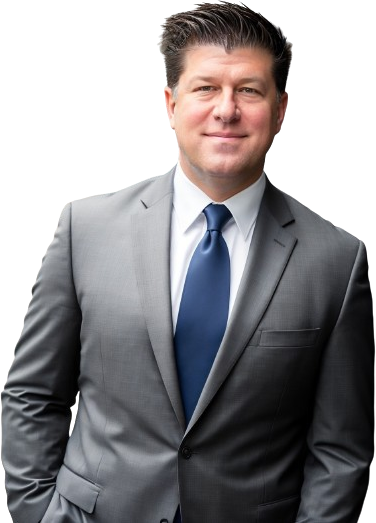
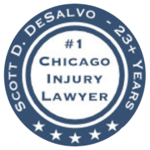

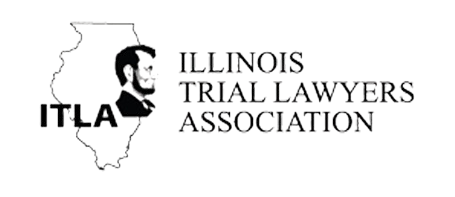
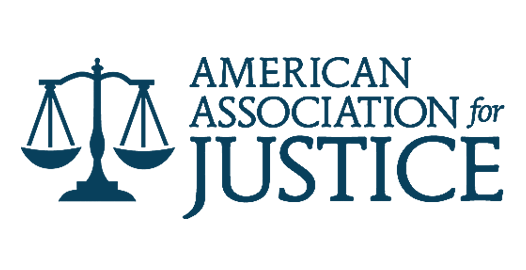
Last winter, I'm sitting at my desk and my phone rings. Woman on the other end sounds shaken up. Tells me she was on a CTA bus at State and Madison when it rear-ended a truck. She got thrown right into one of those metal poles—you know the ones. Broke three ribs, completely tore up her shoulder.
But that's not even the crazy part.
Before she could even process what happened to her, some guy shows up at the hospital claiming he's from the bus company. Offers her five grand to sign some papers and forget the whole thing.
Five. Thousand. Dollars.
Thank God something told her to call me first.
You know what we ended up getting her? Over $240,000.
I'm not telling you this to brag. I'm telling you because that five thousand dollar offer? That's exactly what these companies do. They bank on you not knowing any better. They're counting on you signing fast before you talk to someone like me.
I'm Scott DeSalvo. Been doing this almost twenty years now. And I've gotta tell you—I've seen every dirty trick in the book when it comes to bus accidents.
Whether you got hurt on the CTA, one of those Pace buses in the suburbs, a Greyhound, some tour bus near the pier, or even a school bus—you're dealing with way more than you probably think. We're not just talking about some guy's car insurance here.
You're up against government agencies with their own legal departments. Federal regulations most lawyers don't even understand. These "common carrier" laws that barely make sense. And companies whose entire job is figuring out how to pay you nothing.
So here's the deal: I only work for injured people. Never for insurance companies. Never for the other side. Your fight? That's my fight.
And look, I'm gonna be straight with you about how this works: You don't pay me a single penny upfront. Not one dime. I only get paid if I win your case.
Oh, and when I say I'm available 24/7? I mean it. Try me. Call at 3 in the morning. I'll answer. That's not some marketing thing—that's just how I do this.

Most people have no clue how often bus accidents actually happen. When I tell them the numbers, they're usually shocked.
So the Federal Motor Carrier Safety Administration—FMCSA, they track all this stuff—says about 13,000 bus crashes with injuries happen every year in the U.S. Another 231 bus crashes involve someone dying.
Just sit with that for a second.
The National Highway Traffic Safety Administration says roughly 183 bus accidents happen every single day in America. Every. Day.
Here's how it breaks down:
Last year in Illinois? 850 people got hurt in bus crashes. Eight people died.
Just in Chicago, 421 people were injured in bus accidents.
ABC 7 did this report that really stuck with me. They found that a CTA bus accident happens approximately every 36 hours in this city. The CTA moves over 231 million people every year. Think about that. Every day and a half, someone's getting hurt.
These aren't just numbers on a page somewhere. These are people trying to get to work. Kids going to school. Tourists checking out our city. Just regular folks trying to get from point A to point B.
Here's something most people don't think about until it's too late: When you're on a bus, you're not wearing a seatbelt, right? Most buses don't even have them for passengers.
So when that bus stops suddenly, or gets T-boned, or has to swerve—you become a human projectile. You're getting slammed into metal poles, those hard plastic seats, windows, other passengers. It's violent.
People see a big bus and think, "Well, it's big. Must be safe." Physics doesn't work that way. When a 40-foot CTA bus weighing 30,000 pounds is cruising at 35 mph and something goes wrong? The people inside who aren't strapped down are in serious danger.
I've seen what happens. Traumatic brain injuries. Spinal cord damage. Bones broken in multiple places. Internal bleeding. Deep cuts that leave scars. These aren't fender-benders where everyone walks away fine. These injuries completely change your life.
Chicago's got buses everywhere, which means accidents can happen on pretty much any of them. I've handled cases involving all different types.
The CTA runs something like 1,480 buses on 129 different routes. They're making close to 1,900 trips every single day, going through some of the most insane intersections you can imagine. Ever been at State and Lake during rush hour? Michigan and Randolph? It's absolute chaos.
I've seen everything:
Now here's where CTA cases get tricky. They're a government entity. That creates a whole mess of legal complications I'll get into in a minute. But the big one you need to know right now? You've got one year—not two, ONE—to file a lawsuit against the CTA. Miss that deadline and you're done. Forever.
Pace connects all the suburbs. Evanston to Aurora. Oak Park to Schaumburg. You name it. Those suburban routes often run faster than city buses, which means when something goes wrong, it goes really wrong.
When Pace buses crash or when their drivers mess up and people get hurt, I dig into everything. Was the driver trained properly? Was the bus maintained? Did they follow basic safety rules? What shortcuts did they take to save a buck?
Greyhound, Megabus, all those intercity carriers. They're moving thousands of people between Chicago and other cities. Highway speeds for hours at a time. Different kinds of dangers.
These crashes usually involve:
Federal rules govern these companies. When they violate those rules? That makes your case stronger. Way back in 2012, the FMCSA shut down 26 bus companies all at once. Biggest safety crackdown in history. They found drivers without proper licenses, no drug testing, terrible maintenance, drivers working illegal hours.
When companies care more about their bottom line than keeping people safe, this is what happens. And people pay for it with their bodies.
Nothing scares a parent worse than getting a call that their kid got hurt on a school bus. CPS and all the private schools transport thousands of kids every day.
School bus accidents I've dealt with:
Kids deserve protection. School districts have extra duties to keep them safe. When a school bus accident hurts a child, I go after everything I can get. No question.
Chicago gets millions of tourists. Lots of them take tour buses to Navy Pier, Millennium Park, the museums, Wrigley. These companies are supposed to maintain their vehicles and hire qualified drivers.
Tour bus accidents I've seen:
The tour bus industry has a terrible reputation. In 2011 alone, eight serious tour bus crashes killed 28 people. Companies cut corners to offer cheap tickets, and passengers pay the price.
Heading to O'Hare or Midway? You've probably used a shuttle. Hotels run buses for guests too.
These buses have to meet safety standards just like everyone else, but accidents still happen. Rushed drivers. Bad training. Old buses that haven't been maintained. Dangerous loading and unloading situations.
Tons of companies run daily trips from Chicago out to Joliet, Elgin, East Chicago, Rock Island casinos. Casino buses have been in some really bad accidents.
Why? Companies overload buses to squeeze out more profit. Drivers work crazy hours without proper rest. Maintenance gets put off to save money. Safety rules get ignored.
And look, just because you were headed to a casino doesn't mean you don't have rights. You absolutely do.
Understanding why bus accidents happen helps me figure out who screwed up and build a stronger case for you.
Most bus accidents come down to human error. Someone messed up.
The FMCSA has research proving that cell phones and other distractions make crashes more likely in commercial vehicles. Even though it's been illegal for commercial drivers to use handheld phones since 2011, people still do it. I've gotten phone records that prove drivers were texting right when they crashed.
Driver fatigue is a huge cause of tour bus crashes. When companies push drivers past legal limits to keep buses running on schedule, people make deadly mistakes when they're exhausted.
Bus drivers trying to stay on schedule will speed through Chicago's packed streets, run yellows, not yield when they should. Buses take way longer to stop than cars. Speeding makes crashes way more likely.
There's zero excuse for this. Companies have to drug and alcohol test their drivers. Some don't. When impaired drivers cause crashes, both the driver and the company are on the hook.
CTA, Pace, private companies—they all have to properly train drivers. When they don't? Accidents happen.
Buses have thousands of parts that all need maintenance. Common failures: bad brakes, blown tires, steering problems, broken lights.
The FMCSA actually put out a warning in 2012 about overloaded buses. Said tires "loaded beyond weight rating, operated at highway speeds for a long time, are more likely to overheat and fail."
Companies and mechanics have to inspect and fix buses regularly. When they don't, and something breaks and causes a crash? Those maintenance records become crucial evidence.
Our weather is brutal. Icy roads in winter. Snow that kills visibility. Rain that causes hydroplaning. Fog so thick you can't see three feet.
Weather itself isn't negligence. But not adjusting how you drive for conditions? That is. Bus drivers have to slow down, leave more space, be extra careful in bad weather. When they don't, and someone gets hurt, that's on them.
Sometimes cars, trucks, motorcycles cause bus accidents. Running red lights. Not yielding to buses. Driving in bus lanes. Cutting buses off. Texting while driving. Tailgating.
Even when another driver causes the accident, bus passengers can still go after multiple parties to get more money.

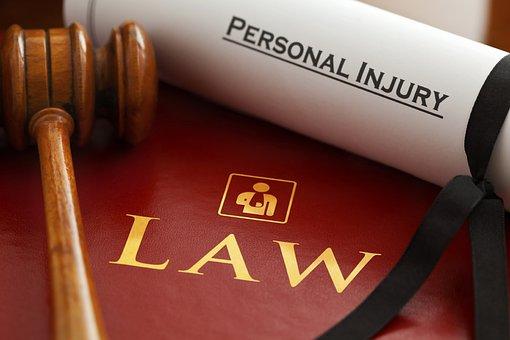

Liability in bus accidents gets complicated fast. Usually multiple parties share responsibility.
Drivers can be held responsible for crashes they cause. Breaking traffic laws. Distracted or impaired driving. Speeding. Not operating the vehicle properly. Not responding to road conditions.
There's this legal thing called respondeat superior. Basically means employers are responsible for what their employees do on the job. Bus companies can be liable for:
Alright, this is where things get complicated. And it's exactly why you need someone who actually knows how to handle CTA cases.
The CTA is an independent government agency under something called the Metropolitan Transit Authority Act (70 ILCS 3605). This creates all kinds of special legal challenges.
The CTA is what's called a "common carrier" under Illinois law. They owe passengers the highest duty of care—way more than regular drivers owe each other. This means the CTA can be held responsible for way more stuff: their employees' intentional acts, other passengers hurting people (if CTA knew about the danger), not kicking out dangerous passengers.
As a government entity, the CTA has some immunity protections. But they're limited. You can absolutely sue the CTA for injuries. Special procedures apply though.
Unlike private companies, the CTA is self-insured. They handle claims directly. You're not dealing with some insurance company. Their claims people and lawyers work directly for the CTA. Their loyalty is 100% to their employer. Not to you.
This is huge: Illinois law gives you only ONE YEAR to file a lawsuit against the CTA. Miss that and you're done. Forever. That's half the time you'd have with a private bus company.
Before you can even sue the CTA, you might have to file this formal notice of claim within specific timeframes. Mess this up and your case can be destroyed before it even starts.
I've successfully sued the CTA dozens of times. I know the procedures. I know the deadlines. I know what tricks their lawyers pull. More importantly, I know how to beat them.
When defective equipment causes or contributes to crashes, manufacturers are liable under product liability law. Bad brakes. Defective tires. Steering failures. Seatbelt failures. Door problems.
Lots of bus operators hire third parties for maintenance. When they do crappy repairs, miss dangerous conditions, use cheap parts, or skip inspections, they're independently liable.
When other vehicles cause bus accidents, their drivers and insurance companies are liable. I go after all available coverage to get you maximum money.

Yes. Absolutely yes. People ask me this constantly, and the answer is always yes—you can sue the CTA, Pace, school districts, other government bus operators.
But suing government entities is way more complicated than suing private companies. That's exactly why you need someone who's done it before.
Many government entities make you file this formal "notice of claim" before you can even sue. The deadline is often super short—sometimes just 90 days. Miss it and you might lose your right to sue entirely.
You've only got one year to sue the CTA under Illinois law. Private companies? You get two years. This catches people by surprise all the time.
Government entities have all these specific administrative hoops you have to jump through. The CTA's self-insured status means their claims process is totally different from dealing with a regular insurance company.
The CTA and other transit authorities aren't fully protected by sovereign immunity for injury claims. Illinois law says public transportation has to be held accountable when their negligence hurts people.
The key is knowing which immunities apply and which don't. Knowing how to structure your claim to beat immunity defenses. With the right legal strategy, you can absolutely hold government entities liable.
I've recovered serious money from the CTA and other government transit operators for my clients. The playing field isn't level. But an experienced attorney levels it.
Find Out What YOUR Case Might Be Worth...for free.
When your accident involves Greyhound, Megabus, or other companies traveling between states, federal regulations from the FMCSA apply.
These regulations give us extra ways to prove negligence.
Federal law strictly limits how long bus drivers can work. Electronic logging devices track driver hours now, making violations easier to prove. When companies pressure drivers to lie about hours or work too long, and fatigue causes crashes, both driver and company are liable.
FMCSA requires comprehensive drug and alcohol testing. Companies that don't test properly or ignore positive results face big liability when impaired drivers cause crashes.
Federal regulations require annual inspections, systematic maintenance, driver inspection reports, brake standards, tire requirements.
Maintenance records are crucial evidence. I subpoena these to prove companies skipped inspections, put off repairs, or ran vehicles with known problems.
FMCSA requires bus drivers to: have valid commercial licenses with passenger endorsement, pass medical exams, meet age requirements, complete training, maintain clean records.
That 2012 FMCSA action I mentioned earlier? They found carriers using drivers without valid CDLs. Absolutely unacceptable.
Since November 2011, federal law bans commercial bus drivers from using handheld phones while driving.
When I investigate crashes, I subpoena phone records to see if drivers violated this right when the accident happened. Cell phone use is powerful evidence of negligence.
No seatbelts on most buses means passengers get seriously hurt even in moderate crashes.
When heads hit metal poles, windows, seats, other hard surfaces, brain injuries happen. TBIs range from concussions to severe brain damage. Memory loss. Cognitive problems. Personality changes. Chronic headaches. Vision and hearing issues. Loss of motor skills. Permanent disability.
Brain injuries often don't show up right away. Symptoms can develop hours or days later. I work with neurologists to document the full extent of brain injuries.
The violent forces in bus crashes can damage the spinal cord. Paraplegia. Quadriplegia. Herniated discs. Fractured vertebrae. Nerve damage. Loss of bowel and bladder control.
Spinal injuries often need multiple surgeries, extensive rehab, permanent lifestyle changes. Lifetime care costs for paralyzed victims can hit millions of dollars.
Common fractures: skull and facial fractures, broken arms and wrists, rib fractures, pelvic fractures, leg and ankle fractures, hip fractures.
Complex fractures might need plates, screws, rods surgically installed. Recovery takes months of physical therapy. Some fractures never fully heal.
Whiplash and other soft tissue injuries are super common. Neck and back strains. Torn ligaments and tendons. Muscle damage. Rotator cuff tears.
Insurance companies love to act like soft tissue injuries are "minor." But people with them know better. These cause chronic pain that might never fully go away. I fight hard for full compensation.
Blunt force trauma can cause internal bleeding, organ damage, ruptured blood vessels, abdominal injuries.
Internal injuries are life-threatening. Need emergency surgery. Often cause long-term complications and permanent organ damage.
Bus accident trauma causes serious psychological injuries. PTSD. Anxiety and panic attacks. Depression. Fear of public transportation. Sleep problems.
Mental health injuries deserve the same consideration as physical ones. I work with psychiatrists and psychologists to document psychological trauma.
In the worst cases, bus accident victims die from their injuries. When negligence causes death, surviving family can pursue wrongful death claims.
Money doesn't replace a lost loved one. But financial compensation helps families stay stable while grieving.

Every case is different. But I fight to recover full compensation for everything you've lost and will lose in the future.
Complete compensation for all healthcare. Emergency room. Ambulance. Hospital. Surgery. Physical therapy. Prescriptions. Medical equipment. Future medical care. Home health care.
I work with life care planners and medical economists to calculate lifetime treatment costs.
Money for income you lost. Time missed from work. Reduced hours during recovery. Lost self-employment income.
When injuries prevent you from returning to your old job or limit career advancement, you deserve compensation for: reduced future earning potential, needing to switch to lower-paying work, total inability to work, loss of retirement benefits.
Vocational experts calculate the present value of lifetime earning losses.
Compensation for physical pain you've endured and will continue experiencing. Chronic pain. Pain from surgeries. Ongoing physical limitations.
The psychological impact of your accident and injuries. PTSD. Anxiety. Depression. Fear about the future. Loss of enjoyment of life.
Permanent injuries affecting your appearance or abilities. Scarring. Limb loss or paralysis. Loss of bodily functions. Physical limitations.
People ask me this constantly. Honest answer? It depends on lots of factors. How severe and permanent your injuries are. How much medical treatment you need. Impact on your ability to work. Your age and life expectancy. How injuries affect your daily life. How negligent the responsible parties were. Available insurance coverage.
I don't accept lowball offers designed to save insurance companies money. Your case is worth what it takes to fully compensate you. Past, present, and future.
Bus accident cases often involve big insurance policies. Commercial buses usually carry way higher liability coverage than regular cars. Sometimes $5 million or more. I know how to access these policies and fight for every dollar you deserve.

If you've been hurt in a bus accident, what you do immediately afterward can make a huge difference in your ability to get compensation.
Your health is priority number one. Even if you feel "okay," see a doctor immediately. Lots of serious injuries don't show symptoms right away.
Going to the ER ensures hidden injuries get diagnosed. Creates medical documentation linking injuries to the accident. Stops insurance companies from claiming injuries happened later.
On CTA or Pace buses: Tell the driver immediately. Make them document it. Get a copy of the incident report or at least the report number.
On private buses: Report to driver and company. Get driver's name, bus number, company info.
Call 911 if anyone is seriously hurt.
If you're physically able, photograph: the accident scene, all vehicles involved, your visible injuries, bus interior, road conditions, bus number.
Get info from: bus driver, other passengers, witnesses, other drivers involved.
Keep: your bus ticket, fare card or receipt, clothes from the accident, damaged personal items, medical records.
Within hours or days, someone will call. They'll say they're from the bus company. They'll sound friendly and concerned. They'll ask you to "just tell them what happened."
DON'T do it without talking to me first.
These statements are designed to trap you. Get you to admit fault. Get you to downplay your injuries. Get you to say something inconsistent they'll use against you later.
Just politely say no and call me.
Bus companies pressure victims to sign stuff. Medical authorization forms. Settlement releases.
DON'T SIGN ANYTHING without having me look at it first. Once you sign a settlement release, you can't go back for more money. Even if your condition gets worse. Even if you discover new injuries. Even if medical bills way exceed the settlement.
Keep all accident-related stuff. Medical bills and records. Prescription receipts. Physical therapy records. Pay stubs showing lost wages. Injury photos. Daily journal documenting pain levels.
Go to every appointment. Complete prescribed physical therapy. Take meds as directed. Follow doctors' restrictions.
Insurance companies watch whether you follow through. If you miss appointments, they'll argue your injuries weren't serious.
Assume everything you post on Facebook, Instagram, Twitter will be seen by insurance adjusters and defense lawyers.
They monitor victims' social media looking for evidence against you. Safest approach: don't post anything about your accident until your case is done.
The sooner you call, the stronger your case. I can immediately preserve critical evidence. Handle all communication with bus companies. Make sure you don't miss deadlines. Start investigating liability.
Remember: You've only got ONE YEAR to sue the CTA. Don't wait until it's too late.
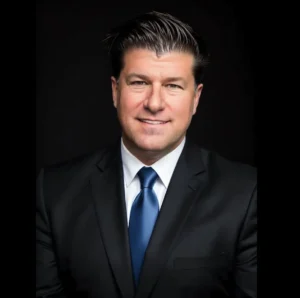
When you're up against powerful bus companies and their legal teams, you need someone who won't back down.
When I was nine years old, my dad got catastrophically injured at work. He was a truck driver. Teamster. That injury took everything from him. His neck, back, spine—all permanently damaged. Changed his life forever.
After he got hurt, he hired the wrong law firm. They were rude. Didn't explain anything. Left money on the table. His case dragged on for 17 years. At the end of those 17 years, his own lawyer sued him to get more fees.
We grew up poor after my dad couldn't work anymore.
So I worked my way through high school, put myself through college and law school, so what happened to my family would NEVER happen to you or your family. I've dedicated my law firm to helping regular people so victims don't get screwed over by the legal system and insurance companies.
I've spent over $100,000 on advanced trial training most lawyers never even think about. I've flown all over the country studying with the best legal minds out there. I'm a graduate of the world-famous "Gerry Spence Trial Lawyer's College" and the prestigious "The Edge" program. Not one in 10,000 lawyers has completed the training I have.
Why? So you get the absolute best, most cutting-edge representation possible.
I know Chicago inside and out. How CTA works. Where accidents happen most. The dangerous intersections. Traffic patterns. Weather hazards.
I've represented bus accident victims all over. Downtown and the Loop. North Side. South Side. West Side. All the Chicagoland suburbs.
You pay nothing out of pocket. No retainer. No hourly charges. No expert fees.
I work on contingency. I only get paid if I win. If I don't win, you owe me nothing.
Bus accidents don't happen 9 to 5, Monday through Friday. When you need help, I'm available. Call me at 2 AM on Christmas Eve if you need to. I'll answer.
This isn't marketing BS. It's how I practice. My clients have my direct number. Can reach me anytime.
You're not a case number. You're a real person whose life got turned upside down.
I deliberately limit my caseload so I can give every client real attention. When you call, you talk to me. Not a paralegal. Not a secretary. Me.
Past results don't guarantee future outcomes. But my experience gives you the best shot at maximum recovery. I've successfully recovered substantial money for bus accident victims. Including six-figure settlements for serious injuries.
I'm not a settlement mill. I prepare every case for trial from day one. When insurance companies or bus operators won't offer fair money, I file suit and go before a jury.
Adjusters know this about me. They know I have trial experience. I'm not afraid to litigate. This often gets better settlement offers.
People who've been hurt deserve to have calls answered. To work with a lawyer they like, trust, and respect. I make sure everyone on my team understands winning your case while helping you is our number one goal.
I've spent two decades studying with the best so you get the very best, most cutting-edge representation possible.
From our in-house case management software to our pre-suit process, my firm discovers more about your case earlier. We beat insurance companies to the punch. Better and faster results.
Hiring Scott was one of the best moves I have made in my life. Scott is a down to earth person and attorney. Scott is a 5 star first class act who really knows his stuff. The Judge said his presentation was one of if not the best he had ever seen. Take my advice, hire Scott I’m sure you’ll be 200% satisfied I was.

Scott not only cares about the case, but he truly cares about his clients and that makes him the best lawyer I have ever met and hired! He won my case! He is thorough in everything he does. I highly recommend Scott, and will always refer him to family and friends.

I hired Scott DeSalvo upon a friend’s recommendation. His office kept me informed of developments as they happened, and I felt the settlement reached was fair considering my injuries. I would highly recommend Scott DeSalvo to represent your personal injury case.

For CTA: Only ONE YEAR from the accident date. Half the normal time.
For Pace and other government buses: Time limits vary. You might have as little as one year. Some also require filing a notice of claim within 90 days to six months.
For private bus companies: Generally two years.
Bottom line: Don't wait. The sooner you call, the more time we have.
Nothing upfront. I work on contingency. I only get paid if I win. My fee is a percentage of your recovery.
No hourly fees. No retainer. No expert costs. If I don't recover money for you, you owe me nothing.
Illinois has "modified comparative negligence" law. You can still recover money as long as you're less than 50% at fault. Your recovery gets reduced by your fault percentage.
I work to minimize or eliminate any alleged fault through thorough investigation.
Yes. Your fare status doesn't eliminate CTA's duty to operate safely.
Police aren't always right. They show up after. Interview people quickly. Make snap judgments. Police reports are one piece of evidence. Not the final word.
I do independent investigations to prove what really happened. I've won many cases where police reports initially favored the bus company.
Most bus accident cases take 1-3 years. Timeline depends on: injury severity and treatment length, liability complexity, whether government entities are involved, whether trial is necessary, insurance company cooperation.
I work as efficiently as possible while building the strongest case.
Most cases settle before trial. You might never see a courtroom. If trial is necessary, I'll prepare you thoroughly.
Either way, I handle all legal work. Your job is recovering.
Don't accept any settlement without having me look at it first. Initial offers are almost always way below fair value.
Call me before accepting anything. I'll review it. Tell you honestly whether it's fair or whether you should demand more.

You didn't ask to get hurt in a bus accident. You were just going about your life. Then someone else's negligence changed everything.
Now you're dealing with painful injuries. Medical bills piling up. Lost income. Uncertainty about your future. Meanwhile, the CTA's claims department or the bus company's adjusters are working overtime to pay you as little as possible.
You need someone fighting for YOU with the same intensity they're fighting for their bottom line.
That's me. I've dedicated my career to helping injury victims like you. I know how to investigate bus accidents. Prove liability. Beat government immunity defenses. Negotiate maximum settlements. When insurance companies won't pay fair value, I take cases to trial and win.
Remember:
The sooner you call, the stronger your case. Evidence disappears. Witnesses forget. Surveillance footage gets deleted. I need to start investigating now.
Sound good?
I represent bus accident victims throughout:
Don't let the bus company and their insurance people take advantage of you. Don't wait until evidence disappears. Don't try to handle this alone.
Your case won't wait. Neither should you.

Don't just take my word for it. Here's what actual clients have said:
"Hiring Scott was one of the best moves I have made in my life. Scott is a down to earth person and attorney. Scott is a 5 star first class act who really knows his stuff. The Judge said his presentation was one of if not the best he had ever seen. Take my advice, hire Scott I'm sure you'll be 200% satisfied I was."
"Scott not only cares about the case, but he truly cares about his clients and that makes him the best lawyer I have ever met and hired! He won my case! He is thorough in everything he does. I highly recommend Scott, and will always refer him to family and friends."
"I hired Scott DeSalvo upon a friend's recommendation. His office kept me informed of developments as they happened, and I felt the settlement reached was fair considering my injuries. I would highly recommend Scott DeSalvo to represent your personal injury case."
4.9 Stars from Google Reviews
Find out why everyone says..."Call My Injury Guy"!
Find out if you have a good case, or a tough one...for free!
After you get into an accident, you might feel overwhelmed. In shock. If you've been hurt, you might not know what to do or where to turn. The pain and uncertainty can feel like too much.
It doesn't matter what kind of accident it was or where it happened. I'm by your side.
If you've been injured in an accident in Illinois, I offer the help you need. Whether you have a case or not, you deserve answers. Some peace of mind.
I only represent injured people. NEVER insurance companies or defendants. I even take the tougher cases other lawyers won't touch. That's because I haven't just dedicated my law firm—I've dedicated my life to representing injured people who otherwise would be facing this without the information and help they need.
Your fight is my fight. You can count on me to help you when you need it most. I will fight for your rights.
There's one particular injury lawyer I'd like you to call. I'll let you guess who that is. (Yeah, that's my sense of humor showing.)
But seriously—if you or someone you love has been hurt in a bus accident anywhere in Chicago, I really hope to hear from you. So I can see how to help.
You can call my office anytime. Night or day. Weekends. Holidays. Whenever.
Why not get a free consultation?
The call is free. The consultation is free. But the peace of mind of having your questions answered? That's priceless.
CALL NOW: 312-500-4500

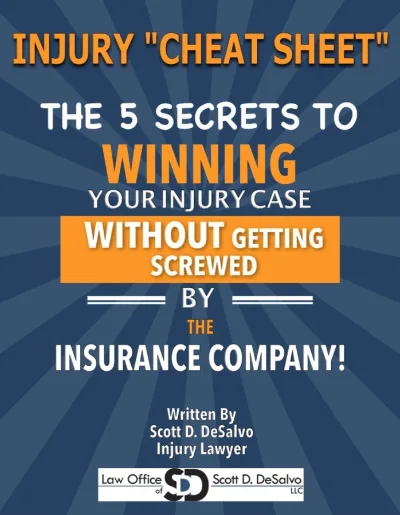

Scott DeSalvo founded DeSalvo Law to help injured people throughout Chicago and surrounding suburbs. Licensed to practice law in Illinois since 1998, IARDC #6244452, Scott has represented over 3,000 clients in personal injury, workers compensation, and accident cases.
No Fee Unless You Win | Free Consultation | 24/7 Availability Call or Text: (312) 500-4500
>>Read More
Main Office:
1000 Jorie Blvd Ste 204
Oak Brook, IL 60523
New Cases: 312-500-4500
Office: 312-895-0545
Fax: 866-629-1817
service@desalvolaw.com
Chicago and Other Suburban Offices
By Appointment Only